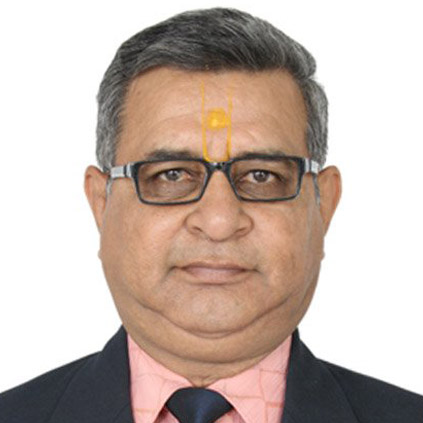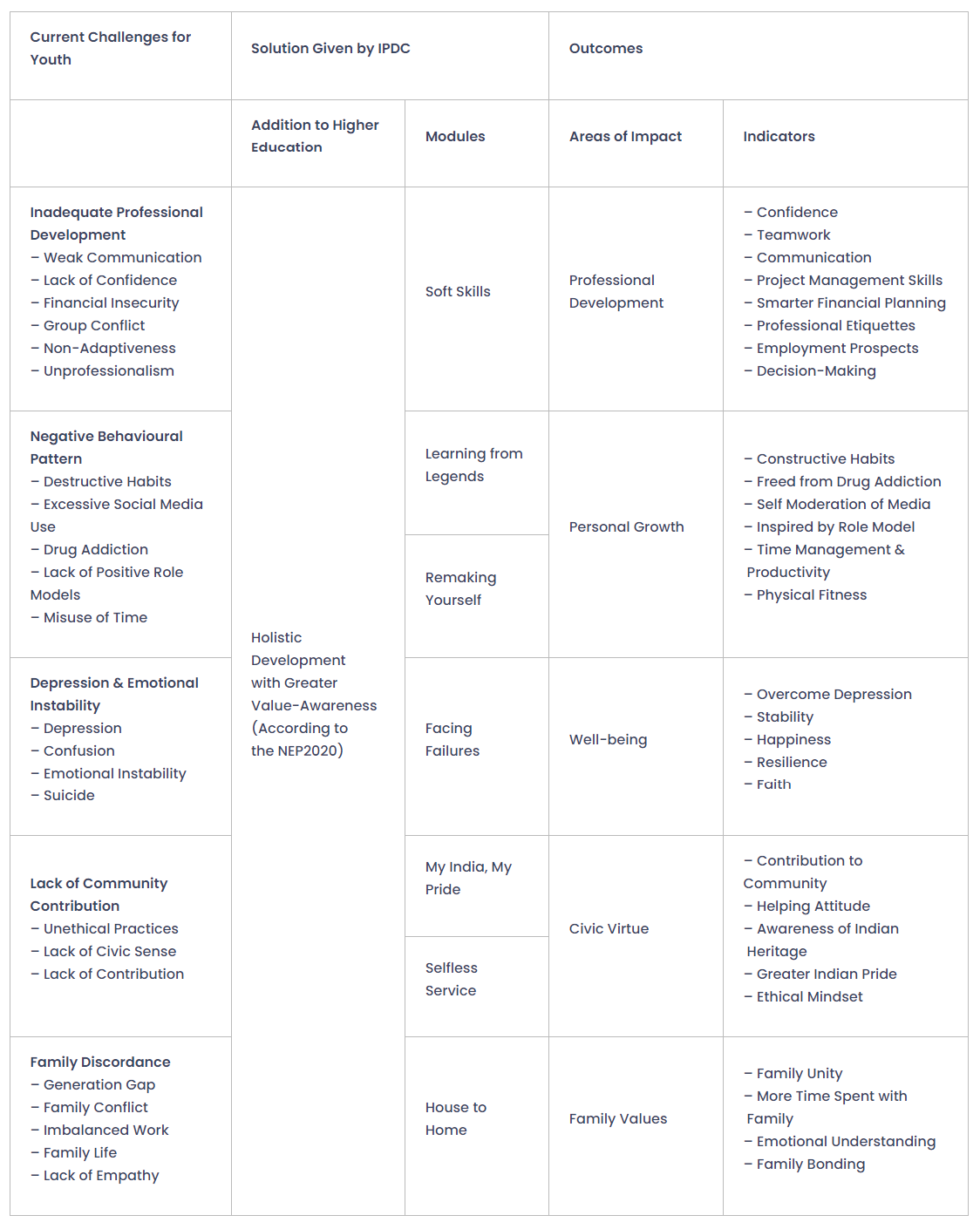The Role of External Organisations in Supporting Educational Institutions to Implement the NEP 2020:
A Case Study of B. A. P. S. Vision
Academics and organisations within the existing education infrastructure and outside have a duty to support the education system to secure a promising future for the next generation of youth and by extension the nation. This paper reviews the role of external organisations in supporting educational institutions to implement the National Education Policy 2020. The case study of B. A. P. S. Vision, a Public Educational Trust, reveals the significant impact of external organisations in this supportive role. This study was conducted through an evaluation of 195 video interviews, live and phone interviews with members of B. A. P. S. Vision and university faculty members, and the assessment of various reports, surveys and other materials. An evaluation of its methodologies and impact throughout this review paper provides greater insights into the holistic education, pedagogical innovations, and multi-organisational collaborations needed to effectively implement the NEP 2020 on a national scale. The paper also explores the development, implementation and impact of the Integrated Personality Development Course and its relevance to NEP 2020.

By Vasudev Ballaney
The National Education Policy 2020
India stands at a tipping point today, with half of its 1.41 billion population1 below the age of 25.2 India’s young population is its most valuable asset, and yet most pressing challenge. With the COVID-19 pandemic increasing levels of loneliness and depression amongst the Indian youth and creating a heightened feeling of insecurity about their future, the current climate is more dynamic and unstable than ever before.3 India’s unique demographic advantage of youth has the potential to lead India to greater heights. But this opportunity will be lost without a proportionate investment into the development of the youth.
Accordingly, the Indian government prioritized a response by initiating the biggest shift in national education in the last 37 years.4
One of the main features of this policy is that it insists that educational institutes provide a more holistic value-based education to prepare the Indian youth for the challenges of today. In the words of the Honourable Prime Minister Narendra Modi – “This is the moment which is planting the seeds of a new era. The new education policy will give a direction to 21st century India. It needs to be implemented effectively across the country and we need to do it together.” 5[04/12/20].
Academics and organisations within the existing education infrastructure and outside have a duty to support educational institutes to fulfil the requirements of the NEP 2020. The case study of B. A. P. S. Vision, a Public Educational Trust, reveals the significant impact of external organisations in this supportive role. An evaluation of its methodologies and impact throughout this review paper provides greater insights into the relevance of holistic education, pedagogical innovations, and multi-organisational collaborations in the context of the effective implementation of the NEP 2020 on a national scale.
The Development, Implementation and Impact of a More Holistic Approach:
(1) The Development of Holistic Syllabi
To secure the future of India’s youth, the national educational policy encourages education institutes to include a more holistic approach to develop students’ social, emotional, moral, psychological, professional, and physical quotients, in addition to their intelligence. It recommends more emphasis on values, ethics, and character- based development to ensure fundamental and long-term growth.6
The National Education Policy 2020 details a variety of fundamental values that should guide both the education system at large, as well as the individual institutions within it:
- “Education Policy […] is based on the principle that education must develop not only cognitive capacities – both the ‘foundational capacities ’of literacy and numeracy and ‘higher-order’ cognitive capacities, such as critical thinking and problem solving – but also social, ethical, and emotional capacities and dispositions.” [NEP, Page 4]
- “Ethics, human, and constitutional values like empathy, respect for others, spirit of service, responsibility.” [Page 5]
- “Life skills such as communication, cooperation, teamwork, resilience.” [Page 5]
- “A rootedness and pride in India, and its rich, diverse, ancient and modern culture and knowledge systems and traditions” [Page 5]
- “Citizenship values, and also life-skills; lessons in seva/service and participation in community service programmes will be considered an integral part of a holistic education.” [Page 37]
- “An ethic of social engagement; soft skills, such as communication, discussion and debate.” [Page 37]
- “The development of capacities that promote student wellness such as fitness, good health, psycho-social well-being, and sound ethical grounding is also critical for high-quality learning.” [Page 38]
B. A. P. S. Vision focuses on providing youth with value-based development and has been doing so for the last two decades under the guidance of his Late Holiness Pramukh Swami Maharaj. Foreseeing the increased national importance of a more holistic education, B. A. P. S. Vision has spent the last seven years harnessing its expertise to provide value-based education to a wider audience according to the guidelines of national educational policy.7 They have developed syllabi for the nation’s youth that can be easily integrated into the existing structure of government and private educational institutions. 8
In 2016, B. A. P. S. Vision created, Chalo Adarsh Baniye, a value-based education course that has been successfully implemented into the existing syllabus of 20,000 primary schools in over 20 districts of Gujarat – positively impacting the lives of over 42 lakh children. Through an engaging video medium, it provides universal lessons that improve the students’ behavioural development, communicational skills, ethical decision-making, voluntary spirit, emotional intelligence, health awareness, environmental awareness, academic excellence, family values, national pride, cultural values, and interest in the sciences.9
In 2019, B. A. P. S. Vision developed a course to empower HEIs to fulfil the requirements of NEP called the Integrated Personality Development Course (IPDC). Over the last 4 years, 1.5 lakh students have been positively impacted at 22 universities (more than 500 colleges).10This course supports the requirements of the 2020 National Education Policy, to “build character, enable learners to be ethical, rational, compassionate, and caring, while at the same time prepare them for gainful, fulfilling employment” [NEP2020 Page 3]. The IPDC content, supporting material, and faculty training also ensure the delivery of an effective, formative learning experience according to the NEP guidelines.
To directly address the biggest challenges faced by youth, the IPDC syllabus was designed with the intention11 to provide the holistic values and skills required by NEP2020 as cited previously. These can be grouped into five areas: (1) Professional Development, (2) Personal Growth (3) Well-being, (4) Civic Virtues, and (5) Family Values. The challenge-solution-outcomes process is shown in Table 112
(2) Implementation: Collaboration with HEIs, Pedagogical Innovations, and Empowering Faculties
To fulfil its long-term objectives, the NEP2020 recommends innovative pedagogy. B. A. P. S. Vision has effectively collaborated with HEIs to empower their faculties by providing quality educational resources, access to newer technologies, and faculty training to ensure the delivery of an effective, formative learning experience according to the NEP guidelines.13
- “[The] attainment of such a holistic and multidisciplinary education […] of all HEIs shall include credit-based courses and projects in the areas of […] value-based education.” [NEP2020, Page 37]
B. A. P. S. Vision provides the Integrated Personality Development Course (IPDC) free of cost to empower HEIs to provide their students with a more holistic value-based education according to NEP2020. It takes the form of a two-semester, credit-based course and has been seamlessly implemented as part of the existing structure of undergraduate and diploma courses across more than 500 colleges.14
- “Emphasis on conceptual understanding rather than rote learning and learning-for-exams” [NEP, Page 5] “Pedagogy must evolve to make education more experiential, holistic, integrated, inquiry-driven, discovery-oriented, learner-centred, discussion-based, flexible, and, of course, enjoyable.” [NEP, Page 3]
The IPDC methodology replaces rote learning with conceptional learning and practical application. IPDC learning uses group discussion, self-exploration, guided discovery, case study analysis, practical assignments, student contribution, role-play, and constructive thinking, to enable students to comprehensively understand, enjoy, and practically imbibe the invaluable lessons they learn.15
- “Extensive use of technology in teaching and learning” [NEP, Page 5]
IPDC has replaced the outdated, traditional lecture style with a high-tech learning experience. An expert team of producers have created captivating short films, interactive visuals, dramatic narratives, and ultra-high-definition video mediums to enable students to effectively engage with every topic.16 The lecture videos allow professionals and experts from around the world to share their expertise with the students. These resources have been prepared and are provided, free of cost, to all teachers of this course.17
- “Teachers and faculty as the heart of the learning process” [NEP, Page 5]
The IPDC initiative places teaching faculty at the centre of the learning progress. They are provided with extensive and exclusive teaching resources and preparation. This includes an in-classroom teaching app, a preparative phone app, captivating short films, expert lecture videos, creative workbooks, teacher’s guides and the training to effectively use them.18 Faculty members are provided with the platform to advance their teaching skills, become effective mentors, and experience a higher level of job satisfaction.19
(3) The Impact: The Relevance and Results
B. A. P. S. Vision has effectively developed holistic syllabi and collaborated with 22 government and private universities to meet the recent requirements of NEP2020. The impact measured of the IPDC initiative indicates the potential impact of NEP over the next few decades if implemented effectively.
An external research group headed by Dr Bhavesh Vanpariya, Faculty and Coordinator at the Department of Human Resource Development, VNSG University, Surat, assessed the impact of the IPDC initiative. The group surveyed a sample of students and assessed their experience using the outcome indicators shown in Table 1. They noted that more than 80% of students were positively impacted in five areas: professional development, personal growth, health and well-being, civic virtue, and family harmony (see Table 2)20. They also highlighted that the impact and student satisfaction levels were consistent across all genders, socioeconomic backgrounds, and appropriate age groups.21
5 Areas of Impact

Professional Development
teamwork
integrity
strong work ethic

Personal Growth
constructive habits
self-awareness

Health & Wellbeing
self-confidence
mental wellbeing

Civic Virtue
helping attitude
volunteerism

Family Harmony
conflict resolution
communication skills
An internal survey was conducted by the IPDC administration of 958 faculty members currently teaching IPDC at their colleges. 56% stated that student attendance increased due to the IPDC initiative. 98% stated that the course would be beneficial for students of all backgrounds.22
 A collection of 195 interviews were taken across 37 colleges. The interviews have been grouped to create 41 videos and have been published online.23The testimonials reveal tangible life transformations, personal and academic growth, better employability and a wide range of positive experiences.24
A collection of 195 interviews were taken across 37 colleges. The interviews have been grouped to create 41 videos and have been published online.23The testimonials reveal tangible life transformations, personal and academic growth, better employability and a wide range of positive experiences.24
By studying and contributing to the objectives of NEP 2020, external academic groups, public educational trusts, NGOs and similar organisations, like B. A. P. S. Vision, can play a significant role in supporting the existing academic infrastructure. Multi-organisational collaboration also has the potential to provide greater pedagogical innovations including effective content creation and technology usage; more efficient distribution of responsibility, and a more impactful and satisfactory learning experience.
Citations:


